For many people, spring is the perfect time to do an annual deep clean. The weather has just begun to get warm, trees are budding, and there’s more sunlight to illuminate those nooks and crannies where dust and clutter collect. But what about your medicine cabinet? This is one space that most people rarely dig into, unless they are in the process of moving to a new home. If you don’t already clean out your loved one’s medicine cabinet annually, now might be the time to begin this new tradition. Read on for our guide to making sure your loved one’s medicine cabinet is clean and ready for another year.
Check Dates
Not only can out-of-date medications lose their effectiveness, according to the FDA, some expired medications can grow dangerous bacteria. In addition, using an expired antibiotic that has lost potency can fail to treat an infection, and the lowered dose can lead to more serious illnesses that become resistant to that and other antibiotics over time.
If your loved one does have expired medications to dispose of, whether over-the-counter or prescription, the FDA recommends following these steps:
- Remove the drugs from their original containers and mix with something undesirable, such as used coffee grounds, dirt, or cat litter. (This will help protect scavengers, pets, and children from accidental ingestion.)
- Put the mixture in something you can close (a resealable zipper storage bag, empty can, or other container) to prevent the drug from spilling out.
- Throw the container in the garbage.
When to Check With the Doctor
If any of your loved one’s expired medications are prescriptions, call their doctor to find out if these need to be refilled. This is also a good time to make sure your loved one is keeping up on taking long-term prescriptions. If a bottle is expired and still contains pills, it may be a sign they are missing doses. Once you have spoken to their doctor and gotten the all-clear, scratch your loved one’s name and identifying information off the empty pill bottle before disposing of it in the trash.
Disposing of Prescription Pain Medications
If your loved one has expired prescriptions for controlled substances such as opioids like oxycodone, hydrocodone, codeine, or fentanyl, you will need to dispose of them differently. Contact local law enforcement officials for recommendations on disposal. Many communities have regular take-back days where you can give these addictive medications to the authorities to dispose of. If no program is available, you can also safely flush these drugs down the toilet. (Note: There is mixed information on the internet about whether it’s safe for the environment to flush these drugs, but a recent study published by the FDA found the risk to be negligible.)
Medicines to Keep on Hand
After you’ve purged your loved one’s medicine cabinet, it’s time to make sure they’re stocked up on the essentials. People’s medicine cabinets and bathroom cupboards often become clogged with unnecessary items bought over the years to treat a variety of short-term ailments. But there are some items that it’s always helpful to have on hand in case of a cold, cut, or other minor ailment.
- Antibacterial Ointment
- Antihistamine
- Decongestant
- Cough Medicine
- Pain Reliever (Aspirin, Ibuprofen, Acetaminophen)
- Antidiarrheal Medication (Pepto-Bismol, Imodium, etc.)
- Adhesive Bandages
- Medical Tape
- Gauze
- Burn Ointment
- Hydrogen Peroxide
- Calcium Carbonate Tablets (Tums, Rolaids)
- Eye Drops
- Disposal Rubber or Vinyl Gloves
Pat Yourself on the Back
Now that your loved one’s medicine cabinet is clean, organized, and stocked with the necessities, you can rest easy knowing any minor injuries or ailments are covered. Residents of Brightwater Senior Living communities enjoy the additional security of our highly trained caregivers who are always ready to step in and offer a helping hand.
To learn more about Brightwater Senior Living and the services we provide, visit the Living Options page on our website.
